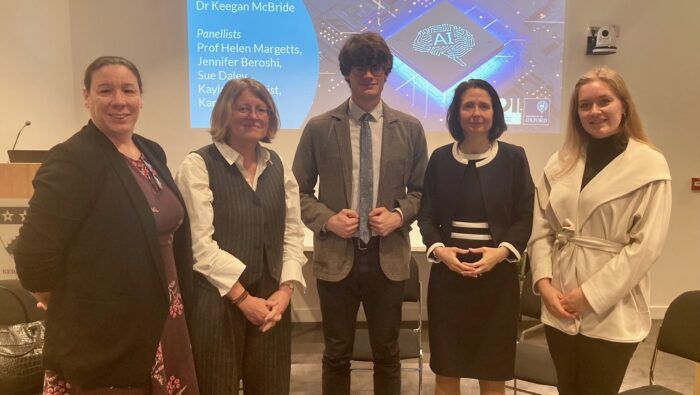Artificial Intelligence is transformative and a really exciting technology - but it is also just computer science and not 'new'. It poses risks in the future - but we must not ignore the risks of today. The UK is well placed to become a leader in AI regulation, but needs to take action now.
A packed conference hall at the University of Oxford heard experts from Oxford, industry and regulation discuss the risks, the rewards and the regulation of AI as part of the Oxford Internet Institute's (OII) conference: Searching for a Place at the Table: What is the Role of the United Kingdom in the Development and Regulation of Artificial Intelligence?
While participants agreed the UK is a leading nation in the AI landscape, with expertise in both practical and regulatory matters, they concurred there is much to do.
The audience heard from a distinguished panel: Oxford Professor Helen Margetts, also director of the public policy programme at the Alan Turing Institute; Sue Daly, a director at techUK; Karen Croxson, from the Competition and Markets Authority and Kayla Blomquist, an AI governance researcher at the OII. Chaired by OII's Dr Keegan McBride, they set out the challenges and the opportunities presented by the technology and focused on the role that could be played by the UK, as the Government's AI Safety Summit taking place at nearby Bletchley Park.
The UK AI sector is thriving, with a combination of global players and UK firms. We are third in the world behind the US and China and that is something to celebrate
Sue Daly
The need for good regulation was acknowledged by all, with the key principles including safety, transparency; fairness and robustness. But it was estimated there are 70 authorities in the UK with some responsibility for AI regulation, and many currently do not see it as part of their role. The important issue though, is that it should not just 'happen', maintained the experts, who agreed it is important to provide resources to support the development of robust regulation, with the technology moving very quickly.
It is wrong to focus on long term risks and safety, when people are not feeling safe at the moment
It was not the existential risks posed by so-called 'frontier AI', so much as current safety that concerned the experts. According to one participant, 'It is wrong to focus on long term risks and safety, when people are not feeling safe at the moment.'
Karen Croxson insisted there is a need to focus on opportunities as well as potential immediate and longer-term harms. Harms could include 'false information, fake reviews, AI-enabled fraud and deception, to potential future entrenchment of market power'.
 From left, Sue Daly, Helen Margetts, Keegan McBride, Karen Croxson and Kayla Blomquist
From left, Sue Daly, Helen Margetts, Keegan McBride, Karen Croxson and Kayla BlomquistProfessor Margetts, who is a participant in the Bletchley meetings, maintained, 'I worry about the focus on existential risk, which may mean people becoming unnecessarily scared. Of course, we must research possible long-term risks, as we have done successfully for other technologies (such as gene editing), but we must also research how to achieve the potential benefits, and the more immediate dangers, including the possibility of online harms being turbocharged by AI. '
I worry about the focus on existential risk, which may mean people becoming unnecessarily scared. Of course, we must research possible long-term risks...but we must also research how to achieve the potential benefits...
Professor Helen Margetts
She added, 'When you talk to a representative sample of the general public about applications of AI in the real world, rather than AI in the abstract, you get an interesting, nuanced and sophisticated view of how they actually experience AI, the benefits they see, and the concerns that they have.'
Having said that, conference experts insisted it was important not to forget the opportunities and the benefits presented by AI.
Sue Daly explained, 'The UK AI sector is thriving, with a combination of global players and UK firms. We are third in the world behind the US and China and that is something to celebrate.'
Meanwhile, the OII's Kayla Blomquist said, 'The UK's education system is a massive draw for international talent.'






